1,071 news posts

Featured news
24 Jul 2023
Meet a scientist who studies how to save lives in a nuclear disaster
by Prof Hiroshi Yasuda/Angharad Brewer Gillham, Frontiers science writer Prof Yasuda pictured at the Hiroshima Peace Memorial Park. Image: Hiroshi Yasuda. Prof Hiroshi Yasuda has been studying the consequences of radioactive contamination since he was a student at Kyoto University, inspired by the Chernobyl accident of April 1986. A pioneer of research into radiological protection for astronauts and aircraft crew members, he has worked for international bodies such as the United Nations and the International Atomic Energy Agency (IAEA) as an expert on radiological impact assessment. After the Fukushima Daiichi accident of March 2011, he led the effort to assess the exposure to radiation of Fukushima residents, and led the official report on the accident for the United Nations Scientific Committee on the Effects of Atomic Radiation (UNSCEAR). He now works at Hiroshima University, continuing his research and teaching a new generation of students about radiation sciences. Yasuda is the author of a new article in Frontiers in Public Health which discusses how best to protect hospital patients during nuclear emergencies, and has kindly taken the time to share some thoughts about his career and research as part of the Frontiers Scientist series. What inspired you to become a researcher? […]

Environment
21 Jul 2023
Tourists help scientists reveal microplastic pollution on remote Arctic beaches
by Angharad Brewer Gillham, Frontiers science writer Image/Shutterstock.com We know that microplastic contamination has reached the Arctic, but quantifying the amount that appears on beaches and understanding where it came from is difficult. Scientists asked tourists on Arctic cruises to take part in a program of sample collection while visiting Svalbard and used these samples to identify microplastics that probably originated from ships and fishing net. Tourists acting as citizen scientists have helped a research team detect microplastics on remote Arctic beaches. The global scale of plastic production means that these tiny fragments of plastic are now ubiquitous, and scientists fear that ocean currents will cause plastic to accumulate in the Arctic, damaging ecosystems. But our knowledge of the scale and type of plastic pollution in the Arctic is incomplete. Researchers recruited holidaymakers to carry out sample collection during cruises, hoping to fill in some of the gaps in their knowledge. “Plastic pollution is now ubiquitous. It is found on land and in soil and most rivers of the world,” said Dr Bruno Walther of the Alfred Wegener Institute, Helmholtz Centre for Polar and Marine Research, author of the study in Frontiers in Environmental Science. “It is even found in […]

Featured news
20 Jul 2023
Frontiers adopts CRediT to enhance clarity in research authorship
Frontiers journals have adopted the Contributor Roles Taxonomy (CRediT) to improve the way authors’ contributions to research are communicated and acknowledged. The new system replaces the conventional free-text authorship descriptions with a standardized and transparent system that ensures consistency and accuracy in recognizing individual contributions. Photo credit: Frontiers CRediT categorizes individual author contributions into well-defined roles and provides a clear, concise framework to describe the diverse contributions made by researchers during the research process. By adopting CRediT, Frontiers aims to acknowledge the diverse contributions of researchers, irrespective of whether they are primary or supporting contributors. Authors will can now select from a predefined set of CRediT roles, which encompass various aspects of research involvement, such as: Conceptualization Data Curation Formal Analysis Funding Acquisition Investigation Methodology Project Administration Resources Software Supervision Validation Visualization Writing – Original Draft Writing – Review & Editing Providing readers, reviewers, and fellow researchers with a thorough understanding of each author’s contributions is crucial for fostering transparency and upholding the integrity of research publications. The implementation of standardized CRediT roles serves as a valuable tool in mitigating disputes concerning authorship and mitigating potential conflicts, guaranteeing equitable and inclusive acknowledgment of all contributors. Furthermore, CRediT empowers institutions and […]

Featured news
18 Jul 2023
Smiles all round: clinical trial shows that a toothpaste containing synthetic tooth minerals can prevent cavities as effectively as fluoride
by Angharad Brewer Gillham, Frontiers science writer Image/Shutterstock.com Scientists studying alternatives to fluoride toothpastes tested out hydroxyapatite toothpaste, which is already known to help people who are at particular risk for cavities or have trouble with dental sensitivity and periodontitis, but which hasn’t been trialed in adults with healthy teeth. Patients used either a hydroxyapatite toothpaste or a fluoride toothpaste for 18 months. At the end of this period, the patients using hydroxyapatite toothpaste were no more likely to develop cavities than the patients using fluoride. Brushing twice a day keeps the dentist away – but can we improve on the toothpaste we use to maintain clean teeth, preventing medical issues that spiral from poor dental health? Most toothpastes use fluoride, a powerful tool for oral hygiene. However, fluoride can pose health problems in some cases, especially for children who consume too much fluoride by swallowing most of their toothpaste: children normally use only a tiny dose of toothpaste to avoid these problems, but that reduces toothbrushing efficacy. In the search for alternatives, a team of international scientists and Polish clinicians have identified a hydroxyapatite toothpaste that works just as well as fluoride toothpaste to protect against cavities. “Hydroxyapatite is […]
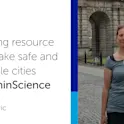
Frontiers news
17 Jul 2023
Ivana Dusparic – Optimizing resource use to make safe and sustainable cities
Author: Emma Phipps Dr Ivana Dusparic is an associate professor at the School of Computer Science and Statistics at Trinity College Dublin, Ireland, where her research predominantly focuses on the AI-based optimization of resources in large-scale urban infrastructures. In honor of the United Nations Sustainable Development Goal 11, I spoke to Ivana about how her research contributes to making cities and human settlements safe and sustainable. Photo credit: Ivana Dusparic Could you start by giving us an overview of your main areas of research? “I’m a computer scientist. I studied applied mathematics and computer science at the undergraduate level and my master’s and PhD were both in computer science. Although the fundamental work I do is very computer science-oriented, I believe it can be a lot more useful when applied to real-life situations. That’s where the application to sustainability through management of large-scale infrastructures in cities came about. “My main research area is a branch of artificial intelligence (AI) called ‘reinforcement learning,’ which stems from psychology and neuroscience. It works in the same way as how humans and animals learn: we do something; we don’t know if it’s good or bad; and then we observe the outcome in the environment, […]
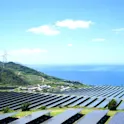
Environment
17 Jul 2023
Soil dwellers thrive in between solar panels: Here are five Frontiers articles you won’t want to miss
By Deborah Pirchner, Frontiers science writer Image: Shutterstock.com At Frontiers, we bring some of the world’s best research to a global audience. But with tens of thousands of articles published each year, it’s impossible to cover all of them. Here are just five amazing papers you may have missed. Solar parks can house semi-natural grassland communities Solar parks are sustainable ways to ensure clean energy. The ecosystems in which they are built are often sites that are excessively managed and affected by habitat destruction. This land management, however, also offers opportunity to restore or even create semi-natural grasslands. Researchers in France have studied 10 solar parks in the south of the country to examine plant community composition, soil biodiversity, and soil functioning under and outside of solar panels to test whether they hamper soil health. They have now published their results in Frontiers in Environmental Science. Their results indicate that the microclimate under panels influenced the abundance of soil megafauna, fungi biomass, and bacteria. Plant communities under panels tended to be made up of more shade-tolerant species, which reduced plant diversity and vegetation cover. Between panels, however, the researchers found more trophic interactions than outside or under solar panels. This suggested […]

Engineering
14 Jul 2023
Scientists knit futuristic eco-building designs using fungal networks
by Angharad Brewer Gillham, Frontiers science writer Image courtesy of the Hub for Biotechnology in the Built Environment Scientists have developed mycocrete, a paste made with the root network of fungus called mycelium, as a building material. Injecting this into a knitted textile framework creates a composite material which is stronger and more versatile than previous biomaterials made of fungi and could eventually be used to construct lightweight buildings with low environmental impact. Scientists hoping to reduce the environmental impact of the construction industry have developed a way to grow building materials using knitted molds and the root network of fungi. Although researchers have experimented with similar composites before, the shape and growth constraints of the organic material have made it hard to develop diverse applications that fulfil its potential. Using the knitted molds as a flexible framework or ‘formwork’, the scientists created a composite called ‘mycocrete’ which is stronger and more versatile in terms of shape and form, allowing the scientists to grow lightweight and relatively eco-friendly construction materials. “Our ambition is to transform the look, feel and wellbeing of architectural spaces using mycelium in combination with biobased materials such as wool, sawdust and cellulose,” said Dr Jane Scott […]
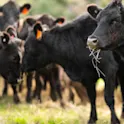
Climate action
13 Jul 2023
‘Red sea plume’ alga may cut greenhouse gas emissions from cow poo nearly in half
By Deborah Pirchner, Frontiers science writer Image: Shutterstock.com Methane production in the livestock sector greatly contributes to greenhouse gas emissions. Animals with four-chambered stomachs produce methane while digesting, however, their manure also emits the gas when decomposing. Recently, natural methane inhibitors have been discussed as a solution. Researchers in Sweden have now examined how supplementing cow feces – rather than cow feed – with such an inhibitor influences methane emission from manure. They found that if a tropical alga was added to dairy cows’ feces, significantly less methane was emitted. Approximately a third of all anthropogenic methane is emitted by ruminant livestock. These animals get nutrients through fermenting food in four-chambered stomachs found in cows, sheep, and goats. They produce methane in two ways: through belching and from the decomposition of their manure under certain conditions. Now, researchers in Sweden have examined if adding the tropical alga Asparagopsis taxiformis (AT), also known as red sea plume, to cow feces impacts greenhouse gas emissions from the manure of dairy cows. They have published their results in Frontiers in Sustainable Food Systems. “We showed that adding AT to the feces of dairy cows significantly reduced methane production from the feces by 44% […]
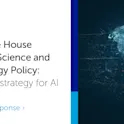
Featured news
12 Jul 2023
Frontiers responds to the White House Office of Science and Technology Policy on its national strategy for artificial intelligence
The White House Office of Science and Technology Policy has launched a call for information to shape the Biden-Harris Administration’s National Artificial Intelligence (AI) Strategy, which in turns seeks to harness the benefits and mitigate the risks of AI. Photo credit: Frontiers A summary of our response General, human-compatible AI could empower us all, but public trust in good science will be key. At Frontiers, we apply our AI tools to help nurture that trust. Our Artificial Intelligence Review Assistant (AIRA) verifies that scientific knowledge is accurately and honestly presented even before our people decide whether to review, endorse, or publish the research paper that contains it. Tackling global existential threats will require the widespread sharing of the latest scientific knowledge. All of it. We think scale matters. Good research published at scale, shared globally, and machine-read across large volumes of information, will grow our chances of success. We welcome the chance to respond to this important request for information from the Office of Science and Technology Policy (OSTP). Frontiers is a leading research publisher and open science platform. It is the third most-cited and sixth largest in the world. The science we publish is peer-reviewed, globally shared, and free to […]

Frontiers news
11 Jul 2023
Frontiers acquires Advanced Optical Technologies
Frontiers has announced the acquisition of the journal Advanced Optical Technologies (AOT). Previously published by De Gruyter and operating under a hybrid model, AOT moved to gold open access when it launched with Frontiers in June 2023. First published in 2012, AOT was established to provide a fully peer-reviewed platform for publishing research in applied optics. Serving a small specialist community, it addresses scientists as well as experts in industrial research and development. Incoming field chief editor Professor Roberto Morandotti of the Institut National de la Recherche Scientifique (INRS), Canada, said: “I am pleased to take on this role and to support our research community to rapidly and freely access the most up-to-date information in optical technologies. The topics covered in the journal fill an important gap in our field which is not always featured in other publications. I look forward to working with Frontiers and the strong and expanding editorial board to take AOT from strength to strength.” Frontiers is committed to making science open, and the acquisition of AOT is an important step towards achieving this mission in the fields of optical design, engineering, and manufacturing. The journal opened for submissions on 30 June 2023 and is already live on its new […]

Featured news
11 Jul 2023
Simple oxygen intervention could help patients ‘dramatically improve’ after brain injuries
by Angharad Brewer Gillham, Frontiers science writer Image/Shutterstock.com Normobaric oxygen, delivered at the same pressure as the atmosphere, is often used to maximize brain cell survival in patients with neurological trauma. Scientists found that giving experimental participants normobaric oxygen through a nasal cannula helped them learn a new visuomotor task more quickly and effectively, raising hopes that this oxygen intervention could also be used for rehabilitation. Motor learning skills let us move through the world: we use them to teach ourselves how to walk, how to pick up a drink, how to run. But age or sickness can weaken our ability to learn motor tasks. Scientists studying the impact of oxygen supplementation on motor learning have found a promising treatment that could help patients who have experienced neurological trauma recover old skills. “A simple and easy to administer treatment with 100% oxygen can drastically improve human motor learning processes,” said Dr Marc Dalecki, now at the German University of Health and Sports in Berlin, senior author of the study in Frontiers in Neuroscience. Repurposing a frontline treatment Our brains need a lot of oxygen. In low-oxygen contexts cognitive function decreases, while in high-oxygen contexts it recovers, and the delivery of […]

Frontiers news
07 Jul 2023
Frontiers institutional partnerships update – summer 2023
The latest news on our collaborations with research institutions, libraries, consortia, and funders. Welcome from Thomas Romano, institutional partnerships global sales manager Our dedicated institutional partnerships team at Frontiers has been actively expanding collaborations with partners on a global scale. This year we have welcomed official policy recommendations in both Europe and North America calling for immediate open access to publicly funded research and we have successfully onboarded more than 40 new partners, each bringing unique contributions to our growing community. Our partnership models are designed to help alleviate the financial burden of publishing on individual researchers and to ensure that everyone reaps the benefits of open access. As our community grows, we are working hard to develop these models, with the goal of providing new sustainable and predictable options that align with library budgeting plans and open science priorities. Credit: Frontiers New partnership announcements Partnerships and renewals recently announced include: Swiss national deal Frontiers’ national agreement with The Consortium of Swiss Academic Libraries (CSAL), first signed in 2022, was renewed for another year. Covering 15 institutions, CSAL is a valued partner in the path toward a national open access strategy in Switzerland. Slovenia national deal Frontiers signed the first publishing agreement […]
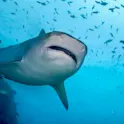
Research Topics
07 Jul 2023
Going to the beach? Here are some research topics on the world's oceans
As we seek to escape the heat of summer at the beach, we are highlighting the top Research Topics on the world’s oceans. Join us by reading up on the incredible findings and solutions made by researchers from across the globe. With more than 1.2 million collective views, scientists explored topics and advanced fields, including work towards sustainable oceans – one of the sustainable development goals, strategies for the conservation of marine megafauna, research on how the oceans may provide food for humans, and insights into how oceans change. Research Topics: Conserving marine megafauna 35 articles | 104,000 views Highlighting the multiple applications of tracking towards the prioritization of conservation goals Ocean-based negative emission technologies 9 articles | 278,000 views Aiming to initiate and catalyze a new branch in marine research that will help guide post-Paris climate policy and will therefore be vital for the Earth’s future Microplastics in the marine environment 24 articles | 176,000 views Gathering knowledge regarding impacts of microplastics in marine environments including robust sampling designs and methods, modelling techniques, mass-balance models to risk assessment predictions and solutions in a circular economy approach Marine biosphere research to benefit society 30 articles | 168,000 views Understanding of […]
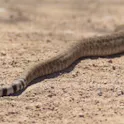
Featured news
06 Jul 2023
Stressed rattlesnakes found to calm down in the company of a nearby ‘friend’
By Deborah Pirchner, Frontiers science writer Image: Jasper Nance/Flickr (CC BY-NC-ND 2.0) When a creature’s stress levels decrease because of the presence of a companion, it is known as social buffering. In highly social animals, such as mammals and birds, this phenomenon is well studied. Now, researchers have examined social buffering in rattlesnakes and found that the presence of a second snake significantly reduced rattlesnakes’ change in heart rates after they experienced disturbance. It is the first evidence of social buffering in reptiles. When animals suffer from acute or chronic stress, they produce more hormones causing shifts in the nervous system, immune response, and behavior. Some animals, if they are in the presence of a conspecific, can modulate their response to buffer stress. This is known as social buffering. There is some research suggesting that snakes can exhibit complex social behavior. Nevertheless, social buffering in reptiles, as well as in other asocial organisms and solitary foragers, hasn’t been studied extensively. Now, researchers in the US have examined if rattlesnakes inhabiting Southern California use social buffering to alleviate acute stress. “We showed that when two snakes were together and experienced a stressful situation, they could buffer each other’s stress response, much […]
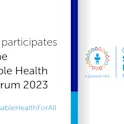
Frontiers news
05 Jul 2023
Frontiers participates in One Sustainable Health for All Forum 2023 on inclusive and adaptive systems for health
Open access publisher Frontiers is participating in the One Sustainable Health for All Forum 2023 co-organized by the One Sustainable Health for All Foundation and the French Development Agency (AFD). The event, which takes place 5-7 July 2023 in Lyon, France, focuses on inclusive and adaptive systems for health and is part of the larger goal to contribute to achieving the United Nations Sustainable Development Goals (SDGs) for 2030. Photo credit: One Sustainable Health for All Foundation The three-day event brings together high-level political and technical stakeholders from more than 50 professional and civil society organizations working across the world on a holistic approach to health that considers human, animal, and environmental health. Participants will exchange knowledge and discuss recommendations drafted by the six international working groups from the One Sustainable Health Forum 2021. Together, they will map out the path towards the integration of a One Sustainable Health approach in policies, budgets, projects, and programs at the country level. The One Sustainable Health for All Foundation was created in September 2020 under the aegis of the Bullukian Foundation in Lyon, France, as a response to the COVID-19 pandemic. COVID-19 highlighted the challenges of interconnected systems for health, which integrate […]